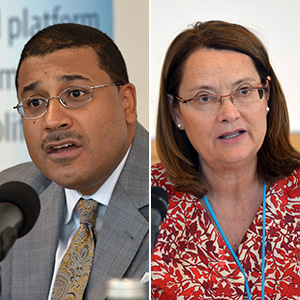


On 19 November 2015, the VCDNP welcomed Frank Rose, US Assistant Secretary of State for Arms Control, Verification and Compliance, and Norwegian Ambassador to Austria and Resident Representative to the IAEA Bente Angell-Hansen, to discuss the "International Partnership for Nuclear Disarmament Verification" (IPNDV). The roundtable constitutes the latest in a long-running sequence of events the VCDNP has held covering aspects of nuclear disarmament verification.
Established in 2014 as a joint endeavor between the United States and the non-governmental organization the Nuclear Threat Initiative, the IPNDV seeks to bring together nuclear weapon states and non-nuclear-weapon states to jointly consider the verification challenges associated with nuclear disarmament. Norway, which for some years has been working with a nuclear-weapon state—the United Kingdom—to investigate methods for verifying nuclear warhead dismantlement, became a key player in the initiative early on, hosting the second plenary meeting in November 2015. The IPNDV builds on lessons learned from the UK-Norway Initiative and the US-UK Technical Cooperation Program.
In his remarks, Mr. Rose explained that the IPNDV has three principal objectives: to build international capacity geared toward finding technical solutions for disarmament monitoring and verification challenges; to improve and broaden the level of understanding of the challenges posed by nuclear disarmament verification; and to provide international leadership by facilitating technical projects designed to meet these challenges.
The VCDNP roundtable convened just after the conclusion of the Partnership's second plenary meeting, held in Oslo, Norway. Mr. Rose said that the 29 partners had made significant progress at the meeting, including reaching agreement on terms of reference for the three working groups that will address monitoring and verification objectives, on-site inspections and technical challenges. The terms of reference are published on the U.S. Department of State and Nuclear Threat Initiative websites.
Mr. Rose also revealed that partners at the Oslo meeting agreed that their work over the next 18-24 months should be focused on the verification of nuclear warhead dismantlement, including monitoring of the storage of the weapons' nuclear material, and would not address in the near term other parts of a nuclear weapon's life-cycle. The partners further agreed that the IPNDV's next plenary meeting would take place in Tokyo in the summer of 2016. The immediate next step was to get the working groups up and running.

In her remarks, Ambassador Angell-Hansen noted that Norway considered its partnership with the United Kingdom to be "pioneering work" in the field of arms control and disarmament, and that the IPNDV was key to further bringing together nuclear-weapon and non-nuclear-weapon states. She drew a comparison between the envisaged work of the IPNDV and the technical work that had laid the groundwork for the Comprehensive Nuclear-Test-Ban Treaty long before the political conditions were right for that treaty's successful negotiation. The IPNDV had been created in the "same spirit": laying the groundwork for such time as political conditions for disarmament are more favorable.
The Ambassador added that, although this was complicated work with no quick fix, the IPNDV was working to promote verification in a "credible" and "concrete" way. Both speakers stressed the IPNDV as an "enduring partnership" that could run for many years to come.